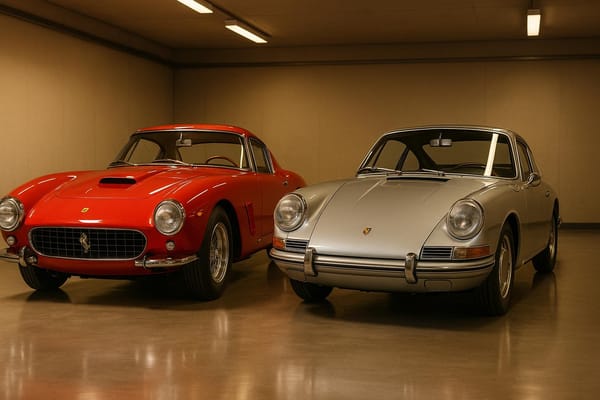Why Limited Production Cars Are Investment-Grade
Limited production cars combine rarity, performance, and heritage, making them both a thrilling drive and a smart investment option.

Limited production cars are more than just vehicles - they combine rarity, performance, and heritage to offer both driving pleasure and significant investment potential. Here's why they stand out:
- Rarity Drives Value: Limited production runs create scarcity, pushing up demand and prices. For example, the Porsche 911R (991 units made) increased from £200,000 to nearly £800,000.
- Proven Returns: Collectible cars have delivered annual appreciation rates of 8–10%, outperforming fine art and real estate.
- Iconic Examples: Models like the Ferrari 250 GTO (£38.2 million) and McLaren F1 (£17+ million) showcase how rarity and heritage fuel extraordinary valuations.
- Tax Benefits in the UK: Classic cars are exempt from Capital Gains Tax, and vehicles over 30 years old benefit from reduced VAT rates.
- Cultural Shift: Younger collectors are driving demand for 1980s and 1990s models, such as the BMW M3 and Porsche 911, reflecting changing tastes.
Owning a limited production car isn't just about investment - it’s about enjoying a piece of history while benefiting from long-term value growth.
Why Buying LIMITED EDITION Hypercars is an INVESTMENT…💰🏎️
How Rarity Affects Market Value
The scarcity of a car can significantly influence its market value. When production numbers are limited, the exclusivity often leads to higher potential returns on investment. This is particularly evident in the case of ultra-rare vehicles.
Supply and Demand in Car Investments
The classic economic principle of supply and demand plays a key role in the rising value of limited-production cars. With supply fixed and collector demand growing, prices can soar. A striking example is the Mercedes-Benz 300 SLR Uhlenhaut Coupé, which fetched an astonishing £112.7 million at auction in 2022. Similarly, the Ferrari 250 GTO, of which only 39 units were built between 1962 and 1964, achieved an auction price of £38.1 million.
In 2024, the global collectible car market is estimated to be worth around £686 billion. Despite this, only 5% of vehicles change hands each year, with just 5,000 transactions involving cars valued above £429,000. These figures highlight the exclusivity and high stakes of this market, where standout models often steal the spotlight.
Success Stories of Limited Cars
The Aston Martin Vanquish Zagato series offers a lesson in how production numbers can impact value. Originally limited to 99 units, the addition of convertible, shooting brake, and speedster variants brought the total to 325. This increase diluted the exclusivity and, as a result, resale values declined.
Certain iconic models showcase how rarity, combined with innovation and heritage, can lead to extraordinary valuations:
| Model | Recent Market Value | Key Value Drivers |
|---|---|---|
| McLaren F1 | £17+ million | Exceptional rarity, cutting-edge technology |
| Ferrari F40 | £2.1–2.5 million | Limited production, legendary status |
| Ferrari Enzo | £3.4+ million | Brand prestige, performance legacy |
| Lamborghini Miura | Up to £3 million | Historical importance, groundbreaking design |
These figures align with broader trends in the collector car market. On average, public listings see transaction prices of £55,800, while auction sales average £64,700. Cars that combine limited production with genuine performance enhancements and strong brand heritage - like the Mercedes-AMG GT Black Series - tend to perform particularly well in this competitive space.
Price Growth of Limited Production Models
Limited production cars have proven to be a solid investment, often outpacing traditional assets. With the global collectible car market projected to reach around £700 billion in 2024, these vehicles represent a compelling financial opportunity.
Long-term Returns
Collectible cars have consistently delivered impressive returns, with average annual appreciation rates between 8–10%. This performance surpasses other investment categories like fine art (5–7%) and real estate (3–5%). For example, the Hagerty Top Index climbed from a value of 100 in 2005 to approximately 700 by 2020, showcasing significant value growth. Iconic models such as the Ferrari 250 GTO, McLaren F1, and Bugatti Veyron have seen extraordinary increases in value over time. A 2022 report by Hagerty Group highlighted a 33% rise in collectible car values within just one year. These returns are further strengthened by the historical and cultural significance tied to these vehicles.
Impact of Heritage
Heritage plays a critical role in maintaining and increasing a car's value over time. Sandra Button, Chairman of the Pebble Beach Concours d'Elegance, captures this sentiment:
"We are proud to note that this shift played a role in saving many great cars. It also brought numerous new businesses and industries into being: restoration and preservation shops, car brokerages, and auction houses, and specialized transport services."
Cars with a rich history or a strong racing pedigree often attract heightened interest. Take the Porsche 911 R, for instance. Known for its unique heritage, this model quickly stabilised at nearly twice its original launch price. Similarly, the Lamborghini Aventador SVJ, limited to just 900 units, has seen remarkable appreciation, with its value reflecting both its exceptional performance and iconic reputation.
The evolution of the collector market further illustrates these trends. The average age of cars sold at auction has dropped from 54 years in 2012 to 38 years by early 2024. This shift signals growing enthusiasm for more recent limited-production models and a broader range of collectors entering the market.
Key Elements of Car Investment Success
When it comes to investing in limited production cars, understanding the factors that drive their value is essential. These elements collectively contribute to a car's ability to hold, and even increase, its worth over time.
Manufacturer Reputation
The reputation of the manufacturer plays a huge role in a car's investment potential. Brands with a rich heritage, particularly those with a history in racing, often offer more stable opportunities. For example, Ferrari's long-standing success on the racetrack has cemented its position as a go-to choice for premium car investments. Similarly, the Mercedes-Benz AMG Black Series benefits from its motorsport legacy and high-performance engineering, leading to consistently high demand and elevated prices. Aston Martin's remanufactured classics, such as the DB4GT, DB4GT Zagato, and the Goldfinger DB5, demonstrate how historical significance can enhance a car's appeal as an investment.
In addition to brand prestige, having proper documentation and a verifiable history is essential to solidify a vehicle’s value.
Papers and History
A car’s documentation and history are critical components of its investment value. Whether it’s maintaining the car in its original condition or ensuring authentic restoration, proper records can significantly boost its desirability. This documentation complements the brand reputation, further establishing the car as a valuable asset.
For example, a 2005 Ferrari Enzo fetched over £4.7 million at RM Sotheby’s in 2015. Its extraordinary value was partly due to its unique history - it was gifted to Pope John Paul II and came with a handwritten note from Ferrari’s chairman. Such provenance makes a car stand out to collectors and enhances its long-term value.
Key documents that add to a car's investment appeal include:
- Original Documentation: Factory-issued items like invoices and build sheets
- Service History: Comprehensive maintenance records
- Ownership Chain: Records of previous owners and storage conditions
- Restoration Details: Information on parts used and work completed
A striking example of how documentation impacts value is the 1970 Porsche 917K, which participated in Le Mans and featured in Steve McQueen’s film Le Mans. This car, with its impeccable history, was valued at an estimated £12.8–£14.8 million at RM Sotheby’s.
The classic car market has experienced a 185% growth in value over the last decade, with annual growth projections of 6.7% from 2022 to 2031. These figures highlight the importance of both reputation and documentation in making informed investment decisions.
UK Market Analysis and Opportunities
UK Sales Data and Patterns
The limited production car market in the UK continues to thrive, driven by some distinct trends. American vehicles are becoming increasingly popular, partly influenced by post-Brexit tariff adjustments. Importing vehicles at the right time - especially as they near significant age milestones - has become a key strategy for maximising returns.
Cars registered before the end of 1984 have seen a boost in value due to their classification as historic vehicles, which makes them exempt from certain taxes. This has created a surge in demand for vehicles approaching the qualifying age, offering a unique opportunity to capitalise on specific UK tax benefits.
UK Tax Advantages
One of the standout benefits in the UK is the Capital Gains Tax (CGT) exemption for classic cars. Additionally, cars over 30 years old qualify for a reduced VAT rate of 5%, instead of the standard 20%.
"Unlike other assets, classic cars, while legally considered 'wasting,' often appreciate over time due to factors like restoration, rarity, and historical appeal. For collectors, the CGT exemption adds even more value to these vehicles."
However, there are two important conditions to keep in mind:
- The vehicle must retain its original configuration for personal use.
- Modifications for racing purposes could affect its tax-exempt status.
Finding Rare Cars Through MARQHAUS

Given these market trends and tax benefits, MARQHAUS provides a tailored platform for sourcing investment-grade vehicles in the UK. Its curated approach aligns perfectly with current market dynamics, assisting collectors in identifying cars that offer both strong investment potential and tax advantages.
The platform's emphasis on rare supercars and classic investment-grade vehicles is especially useful for those targeting cars nearing critical age milestones. For investors navigating the UK’s classic car market, MARQHAUS simplifies the process, offering a streamlined way to uncover opportunities that align with both financial incentives and long-term growth potential.
Conclusion
Limited production cars present a fascinating blend of financial opportunity and collector allure. The global market for collectible cars highlights this, with values reaching an estimated £700 billion in 2024 and an annual trade volume of around £40 billion. These figures underscore the substantial scale of this market and its potential for impressive returns.
Take the Lamborghini Veneno, for example. Originally priced at approximately £3.2 million, its value skyrocketed to over £8.8 million in just a few years. Similarly, the Lancia Aurelia B24 "Spider" saw its value climb by 450% over a decade, going from roughly £173,000 in 2008 to more than £950,000 by 2017.
Even more affordable classics have shown strong growth. Between 2010 and 2020, this segment experienced a 97% increase in value. Notable examples include the 1972 Volkswagen Beetle, which appreciated by £10,285 (a 157% rise), and the 1983 Land Rover Defender, which grew by 113%, adding £15,464.
Engine size also plays a significant role in value trends. In 2023, cars with engines under 2 litres demonstrated stronger appreciation, particularly models from the 1980s and 2010s, which showed remarkable resilience. These performance trends, combined with strategic investment choices, add to the appeal of this market.
Moreover, limited production cars offer notable tax benefits in the UK. As "wasting assets" under tax regulations, they are exempt from capital gains tax. This combination of potential financial growth, tax advantages, and the sheer joy of owning a piece of automotive history makes them a compelling choice for investors who grasp the intricacies of this market. Together, these factors solidify their position as a standout option in the world of historic and performance-focused investments.
FAQs
Why do limited production cars often outperform traditional investments like fine art and property?
Limited production cars are highly sought after because of their scarcity, which sparks strong interest among collectors. When vehicles are produced in small numbers, they often become cherished assets, with their exclusivity contributing to their value increasing over time. This makes them a distinctive investment option, standing apart from more conventional choices like fine art or property.
Beyond their rarity, the heritage and historical importance of certain models can significantly boost their worth. Cars linked to major events, legendary designs, or prestigious brands naturally draw more attention, often resulting in faster appreciation. Unlike real estate or art, which are more exposed to broader market trends, collectible cars belong to a niche market, providing some protection against wider economic shifts.
How does the UK’s tax exemption for classic cars boost their investment appeal?
In the UK, owning a classic car comes with some appealing tax perks that can make them an attractive choice for investors. According to HMRC, most classic cars are classified as 'wasting assets', which means they are not subject to Capital Gains Tax (CGT) unless they are part of a business being actively traded. This allows owners to sell their classic vehicles without having to pay tax on the profits - a feature that enhances their appeal as an investment.
Another financial advantage is that cars over 40 years old are exempt from Vehicle Tax, cutting down on the ongoing costs of ownership. When you combine these tax breaks with the increasing value of rare and desirable classics, they become an interesting option for those looking to explore alternative ways to invest.
How does a car's history and documentation affect its value as an investment?
A car's history and documentation are key factors in boosting its worth as an investment. Detailed records, such as ownership history, service logs, and restoration work, help confirm the car's authenticity and build trust with potential buyers. This kind of transparency can make a vehicle more appealing and, in many cases, significantly boost its market value.
The car's provenance - its unique story - adds another layer of attraction. Cars linked to famous owners, significant historical events, or rare production details often fetch higher prices. In essence, vehicles with thorough documentation and an intriguing backstory are far more likely to be viewed as top-tier investment opportunities.




